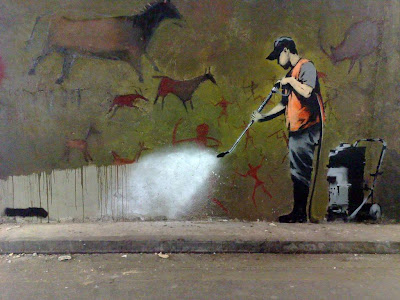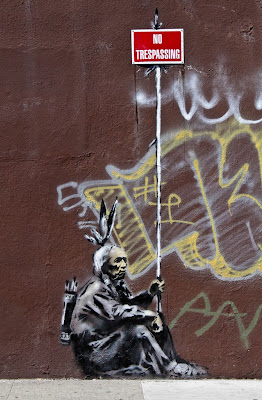I was doing some Surfing and came across THIS LINK ... It's an amazing and informative work that explains how exactly and what exactly is being censored on the internet.
So you still think the internet is for free ?
Sunday, June 12, 2011
The Interwebs

"The Internet is a global system of interconnected computer networks that serve billions of users worldwide. It is a network of networks that consists of millions of private, public, academic, business, and government networks, of local to global scope " - In definition. As a user of the internet, I have found that that internet and in its almost limitless uses i have come to believe that it is only what you make it. The internet thrives on the concept of a participatory society. A prime example of its success the common application known as Face Book has revolutionized the way people communicate almost over night.
The other day a friend of mine and I were talking about when we were children, and how no one had cellphones, or facebook or any of that. And the other way you were really able to get in contact with someone was to ring their door bell. We instantly laughed at the thought of a doorbell for some odd reason, it seemed almost obsolete to us, and humorous. That their doorbells had been replaced with text messaging.
Their many adverse effects to the use of these social systems. As a participant I've experienced that it can go either way, in the case of encouraging activism and promoting a more diverse social system than the concept of it just taking people off the streets as they blog safely in their homes where they no longer threaten repressive regimes. People do both. The organizing of rallies, concerts and parties, art shows and other gatherings do take place on the internet, yet on the other hand there are an endless amount of blogs on everything you can think of, where people document every moment of their life. These tools have led to the extreme virtual and superficial involvement of nearly every aspect of human life. Where people think they are "cool" because they have a high number of Facebook friends. Where people become famous for doing something extremely embarrassing on You Tube. The society of the internet is a complex place, personally i believe the internet tilts in no distinct direction but it is more of a expression of everyone's view, with no biases or alterior motives. Where the use and interpretation is up to you.
Artist : Banksy

“Some people become cops because they want to make the world a better place. Some people become vandals because they want to make the world a better looking place.”
— Banksy

“Nothing in the world is more common than unsuccessful people with talent, leave the house before you find something worth staying in for. ”
— Banksy

“If you want to say something and have people listen then you have to
wear a mask. If you want to be honest then you have to live a lie.”
— Banksy
Media, in all its glory...

In today's technological advance society, things like communication, sharing and convey ideas to others is as easy as logging on to a computer. With conventions such as Face Book, and twitter, even blogging websites ... Where people can update their "status" as much as they want, so all their friends can see. We live in a curious age, where things such as war and famine take a back seat in the world of pressing issues, a place where people are more interested in Charley Sheen's love life, than the current situation of post revolutionary Egypt. Where subjects such as mass death and environmental catastrophes are skimmed over in the daily paper routinely, and not so much as even given a second thought.
There are a number of factors to take into consideration when inquiring about the overall well being and morality of our current society. Personally, being a part of of this era certainly has its perks, conventions such as Google, Wikipedia, facebook etc... Are absolutely revolutionary. Just the concept of having an astounding amount of information at your fingertips, in an instant, has completely changed the way we as humans ask questions, and learn the answers. The Mass Media has evolved exponentially in the past couple decades, bombarding us on all fronts; Advertisements ( of all kinds) Broadcasting media, Digital/Recording media, Publishing media. Are all forms of conveyed information, we as "citizens" are subjected to on a mass scale, to the point of which we are unaware.
The Idea of Social media, is media, in any shape of form, disseminated through social interaction. Via word of mouth, text messaging, blogging facebook, twitter...
This byproduct of evolved media has almost become a counter part, contributing to the rise of counter culture. For generations their have been uprisings, political and social movements, where people fought for what they believed in. During the 1960's their were civil rights, and women's right. The "hippie" movement and the counter culture developed in spite of the war in Vietnam. Where the only way to reach out to people was to actually talk to them. I found it ironic, back then people still got their point across, where people questioned and explored their rights. And now, where a 15 year old can have the world at his/her fingertips, has little to no interests in worldly affairs, no political opinion, or thirst for knowledge as I like to put it. Lets just say the world wont be producing anymore John Lennon's anytime soon...
There are a paralyzingly intimidating number of topics that can be discussed when questioning the media. It is also important to question the source of your media, that is half the battle.It has come to the point to where our minds are saturated with it. In a sense numb to the actuality of most things, disconnected from reality. When your walk down the street, how many people do you notice gazing into their Iphone, or smart phone, and on top of that almost walk into you!
If you thought it couldn't get anymore up to date, you can now get face book notification your your hand held devices, breaking yet another social barrier where now information can be transmitted almost as soon as it happens.
Goals
Do the social media promote freedom of expression and communication, making them catalysts for democracy and activism? Is the Internet tilted towards democracy and participatory society?
Meanwhile, do services like facebook and twitter encourage virtual and superficial involvement over dedication to the kind of activism that makes a difference? Does it just take people off the streets,blogging safely in their homes where they no longer threaten repressive regimes?
Meanwhile, do services like facebook and twitter encourage virtual and superficial involvement over dedication to the kind of activism that makes a difference? Does it just take people off the streets,blogging safely in their homes where they no longer threaten repressive regimes?
Subscribe to:
Comments (Atom)